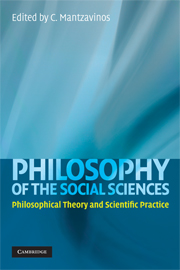Part II - Laws and Explanation in the Social Sciences
Published online by Cambridge University Press: 05 June 2012
Summary
Part II of the book, which is devoted to the methodology of the social sciences, starts with an exchange of arguments about reductionism – an issue originally debated by the logical positivists, then abandoned for many decades. Fodor's paper on “Special sciences: or the disunity of science as a working hypothesis” again shifted attention to the issue. David Papineau starts from the proposition that we are all physicalists now and explores its methodological implications for the human sciences. Even if one maintains physicalism, i.e. the position that human entities must be physical if they are to make a difference in the real world, one does not need to be a classical reductionist. Fodor has respected the requirements of physicalism, while maintaining the autonomy of the human sciences, a claim that Papineau questions, arguing that the human sciences will only contain a rich body of laws to the extent their categories have a uniform physical nature. If he is right, does it matter? He thinks it does matter a great deal, since the prospects for successful human sciences will consequently depend on the extent to which their categories can be viewed as in principle equitable with physical categories. Shulman and Shapiro are very critical of this stance and regard Papineau's view as reflecting an overestimation of the reductive achievements of the social sciences and a flawed conception of what is required for science.
- Type
- Chapter
- Information
- Philosophy of the Social SciencesPhilosophical Theory and Scientific Practice, pp. 99 - 102Publisher: Cambridge University PressPrint publication year: 2009



